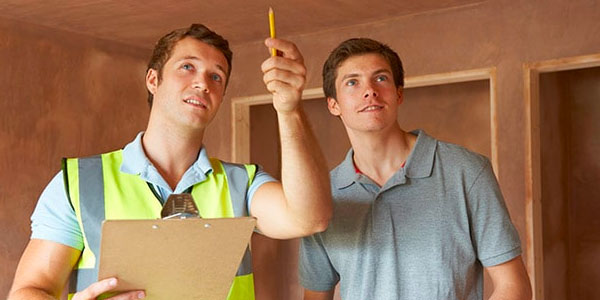The 32-Point Home Inspection Checklist: What to Look for When Buying a Home

Home Inspection Checklist for Buyers
When it comes to purchasing a new home, what you see isn’t always exactly what you get. There are numerous red flags that can pop up while checking out a house. We’ve put together a list of what to look for when buying a home to help you spot them and navigate your search.
What to Do Before You Go House Hunting
House hunting can be an overwhelming process, whether you have been through it before or not. Doing your due diligence prior to starting your search can help alleviate some of the uncertainty.
Find a Real Estate Agent With High Ratings
The best way to find a realtor you can trust is by asking for a referral from your network. You can also use real estate forums and directories, such as Zillow or Realtor.com, to find agents with good reputations in your area.

“It’s smart to interview more than one agent and ask them lots of questions about their niche, their level of experience, and their negotiating skills. Take your time getting to know them, and make sure to get details about their list-to-sales-price ratios — for buyers, you want to find an agent who’s able to get a low sales price compared to the list price, which means that their buyer clients typically pay less than asking price. Ask for references, and don’t forget to consider personality fit. You’ll be talking to this person a lot for weeks, if not months, and compatibility is important!”
Amber Taufen | HomeLight
Research Local Crime Rates and School Districts
If you have a family or plan to start one, it’s good to know the crime rate and quality of the local school systems beforehand. There are numerous sites that track these statistics so you can do your homework before physically visiting the neighborhood:

Home Inspection Checklist for Buyers
Once you have zeroed in on your perfect neighborhood(s), these are the most common things to look for as a buyer, in preparation for the more in-depth work of the formal home buying inspection. The formal home inspection typically won’t occur until after you’ve made an offer and it’s been accepted by the seller, so save yourself some time and heartbreak by being thorough during your home search.
During the initial home tour, you should mark down specific areas of the house that you want your inspector to examine more closely. Use our checklist below to help you spot potential issues in various areas of the home.
House Exterior
Roof
- Are any shingles cupping, curling, cracking or missing?
- Are there any signs of leaks?
- Do the gutters properly drain?
Foundation
- Does any part of the ground near the foundation seem soggy or sunken?
- Can you spot visible cracks on the outside or inside walls?
- Are there any large trees growing near the foundation?
- Do you notice any evidence of termite damage or rotted wood?
Yard and Deck
- Does the drainage slope away from the house?
- Are the walkways and driveway in good condition?
- Does the home have a deck? If so, test the structural boards by jumping. If it feels bouncy, there may be cracked or rotted boards.
Windows and Doors
- Can you spot any signs of moisture around the frames or between panes?
- Do they easily open and close?
- Are the joints around the window frames caulked?
House Interior
Attic and Basement
- Are there any visible signs of water intrusion or moisture?
- Does the attic have sufficient insulation and ventilation?
- If the basement is unfinished, what kind of insulation is there?
Heating and Cooling
- Does the house smell? Can you identify the source?
- Do the heating and AC systems appear to be working?
- Does the water heater produce hot water? How old is it?
- Is there a working exhaust fan in the kitchen?
Appliances
- What appliances will be included with the sale?
- Do the appliances appear to be well-maintained? What are their ages?
Electrical
- Do all the light switches work?
- Is each outlet properly grounded?
- Do the ceiling fans work?
- Has the electrical panel been recalled?
Plumbing
- Do you notice any unusual noises?
- How is the water pressure from the faucets and showers?
- Are the toilets working properly?
- Are there any noticeable leaks under the sinks (bathrooms and kitchen) or rusted pipes?
Miscellaneous
- Does the garage door easily open and close?
- Can you spot the required smoke and carbon monoxide detectors?
First-time homeowner looking to renovate? Our guide will help you learn the skills you need to tackle any DIY project.

“When you make your offer, it should be well thought out and contain a reasonable asking price. Any future price negotiating will come as a result of the home inspection and will give the seller the opportunity to either conduct repairs or reduce the current price of the home to reflect the cost of the necessary repairs.”
Craig Barrett | REX Homes
Additional Home Inspection Tips for First-Time Home Buyers
This process may seem intimidating to a first-time home buyer, but if you do your due diligence and follow this checklist, getting through your home inspection will be a breeze. Some additional tips to make it to the homeowning finish line:
- Request a disclosure statement from the seller that will provide you with any property details you need to be made aware of.
- Make a list of questions to ask your home inspector.
- Attend your home inspection, if possible.
- Identify your deal breakers in advance.
- Compile a list of your contingencies for the seller with your realtor post-inspection.

Hiring a Home Inspector
Your real estate agent should recommend an inspector that they regularly work with and trust, but you could also go out and find one yourself.
Start by looking up inspectors near you using the American Society of Home Inspectors (ASHI) directory, or your preferred local services platform, such as Angie’s List. You will want to find someone with three to five years of full-time experience, and who can also provide proof of licensing (requirements vary by state) and insurance (both general liability and errors and omission coverage).
If you’re buying a house that is 50 years or older, you can find a specialized inspector who is familiar with common problems older homes have.
Considering living in an old house? Look out for these common problems.

“When buying a home, you should always ask for a home inspection contingency. If the seller does not agree, then move on fast. Inspecting the home is the second most critical part of buying a home. Making sure you are prepared and/or approved financially is number one. It is easiest to break down the home inspection process into two sections: the interior and the exterior. There are so many different common problems you should be on the lookout for, so having a licensed home inspector and also being present at the inspection are critical.”
Craig Barrett | REX Homes
Home Inspection Cost
According to HomeAdvisor.com, the average home inspection cost is around $315. This can vary depending on the square footage of the home, how old the home is and if the inspector charges a flat rate or by the hour. If you include radon and mold testing, you may be able to get a package deal.

“Covid-19 has had a significant impact on the home inspection process in most areas. As inspectors are an essential part of the real estate transaction, significant changes have been adopted across the country. Inspectors need to safeguard their personal health, the health of their employees and equally as important, the health and safety of their clients, homeowners and other parties involved in the inspection process.”
Mike Wagner | ASHI
What to Expect From a Home Inspection
The inspection should take no more than three or four hours, after which you will have a full report to review. Any potential problems will be noted on the report – usually with pictures included. Bear in mind that any home is going to have issues and no house will have zero issues. The key is to identify the more costly problems before signing, and use that information to either renegotiate the selling price or walk away.

“InterNACHI is the only U.S. Department of Education University in the inspection industry. Immediately after the pandemic broke out, government agencies asked us to create both standards for home inspectors and a training course. We did and opened it up free to everyone.”
Nick Gromicko | InterNACHI
The most common problems identified on a home inspection checklist include:
- Faulty wiring: Wires without wire nuts, or open junction boxes.
- Faulty plumbing: Low water pressure, or water stains on ceilings.
- Poor drainage: Soggy areas in the yard, or leaks in the basement.
- Bad gutters: Clogged gutters, or basement dampness.
- Foundation flaws: Small cracks, or doors and windows that stick.
- Poor maintenance: Chipped paint, worn shingles, or a cracked driveway.
All of these problems can be easily fixed with the right contractor, and shouldn’t be considered deal breakers. However, if any of the following problems are flagged in the report, you might have second thoughts:
- Roof needs replacement: The average cost of a roof replacement is $7,936.
- The house is in a flood zone: Use FEMA’s flood maps to determine if the home is at risk.
- Major foundation issues: Hire a structural engineer to determine if those cracks are actually serious.
- Aluminum wiring: This type of wiring almost always needs to be replaced, a process that can cost thousands of dollars.
These are some of the most expensive necessary repairs you will come across while house hunting and are worth serious evaluation before moving forward with the sale.
When to Negotiate or Walk Away
If any of these issues pop up during the course of your home inspection, be sure to consult with your real estate agent to see if the sellers can be convinced to pay for the repairs. For certain issues outside the home, such as flood zone considerations, you should be prepared to pay for additional insurance coverage to mitigate your risk.
Don’t let those potential pitfalls deter you from buying the home of your dreams. Instead, just use these inspection findings to make a more educated purchase.

“It is the inspector’s responsibility to provide unbiased information on the condition of the property. Each buyer has different motivation and tolerance thresholds for their particular needs. A good home inspector will provide the information on the house that will enable the buyer to make informed yet independent decisions.”
Mike Wagner | ASHI
Congratulations on Your New Home
Assuming your inspection went well and the seller accepted your offer, you will shortly be experiencing the joys of moving and homeownership.


